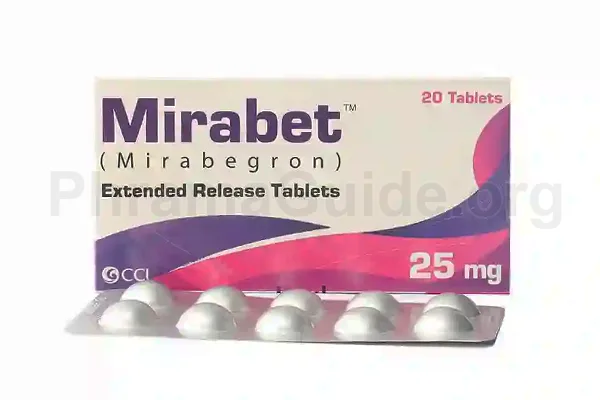Mirabet tablet is a medication primarily used to treat overactive bladder (OAB) and its associated symptoms. The following are some common uses and indications of Mirabet Tablet:
- Overactive Bladder (OAB): Mirabet Tablet is commonly used to manage the symptoms of overactive bladder, which can include frequent urination, urgent need to urinate, and incontinence (involuntary leakage of urine).
- Urinary Incontinence: Mirabet Tablet can also be used to treat urinary incontinence in individuals who have OAB as the underlying cause of their incontinence.
- Increased Urinary Frequency: The use of Mirabet Tablet helps reduce the number of times a person needs to urinate due to OAB.
- The Urgency to Urinate: Using a Mirabet Tablet helps decrease the sudden, strong urge to urinate that is characteristic of OAB.
Off-label Uses of Mirabet Tablet
- Interstitial Cystitis/Bladder Pain Syndrome (IC/BPS): Clinical trials have investigated the potential benefit of Mirabet Tablet in treating IC/BPS, a chronic condition characterized by bladder pain and urinary symptoms. However, further research is needed to establish its effectiveness for this purpose.
- Neurogenic Bladder: There is some evidence suggesting that Mirabet Tablet may be beneficial in managing neurogenic bladder, a condition where the nerve control of the bladder is disrupted due to neurological disorders.
- Chronic Prostatitis/Chronic Pelvic Pain Syndrome (CP/CPPS): Mirabet Tablet has been studied in the context of CP/CPPS, a condition characterized by pelvic pain and urinary symptoms. It may offer relief in some cases, but more research is needed.
- Stress Urinary Incontinence (SUI): Some studies have investigated the use of Mirabet Tablet in the treatment of stress urinary incontinence, although it is not a first-line treatment for this condition.
- Enhancing Bladder Emptying: In some cases, Mirabet Tablet has been considered to help improve bladder emptying in individuals with certain neurological conditions affecting the bladder.

What is Mirabet?
Mirabet is one of the leading brands of Mirabegron, manufactured and marketed by CCL (Consolidated Chemical Laboratories).
Mirabet Tablet’s Alternatives : Other Similar Brands
The following are some alternative brands of Mirabet and their manufacturers.
- Mibega : Getz Pharmaceuticals (Pvt) Ltd, Pakistan.
- Mirexia XR : Ferozsons Laboratories Ltd, Pakistan.
Mirabet : Available Formulations and Strengths
Presently, Mirabet is available in Tablet form.
- Mirabet Tablet : 25mg strength.
Who Should Not Use Mirabet Tablet? – Contraindications
Mirabet tablets have certain contraindications, which are situations or conditions where the use of this medication is not recommended due to the potential for harm.
- Hypersensitivity or Allergy: Individuals with known hypersensitivity or allergy to Mirabegron or any of its components should not take Mirabet tablets.
- Severe Uncontrolled Hypertension (High Blood Pressure): Mirabet Tablet can increase blood pressure, and therefore it is contraindicated in individuals with severe uncontrolled hypertension.
- Severe Hepatic Impairment: Mirabet Tablet should be used with caution in individuals with severe hepatic impairment, and it is contraindicated in those with severe hepatic impairment who are also taking strong CYP3A4 inhibitors (e.g., ketoconazole, clarithromycin).
- Urinary Retention: It is contraindicated in patients with urinary retention, which is the inability to empty the bladder completely.
- Gastric Retention Disorders: Mirabet Tablets should be used with caution in individuals with gastrointestinal conditions that may affect the transit of tablets through the digestive system.
- Severe Renal Impairment: Mirabet Tablet is not recommended for individuals with severe renal impairment, and caution is advised in patients with moderate renal impairment.
- CYP2D6 Poor Metabolizers with Strong CYP2D6 Inhibitors: Concomitant use of strong CYP2D6 inhibitors (e.g., fluoxetine, paroxetine) with Mirabet Tablet is contraindicated in patients who are CYP2D6 poor metabolizers.
- Pregnancy and Breastfeeding: The safety of Mirabet Tablet during pregnancy and lactation has not been established. Therefore, its use in pregnant or breastfeeding individuals should be carefully considered and only used if the potential benefits outweigh the potential risks.
- Age: Mirabet Tablet is typically not recommended for use in pediatric patients, as its safety and effectiveness in this population have not been established.
What is the Recommended Daily Dosage of Mirabet Tablet?
Mirabet Tablet Dose for Overactive Bladder (OAB):
- Initial Dose: One tablet of 25mg once daily
- Maintenance Dose: Depending on the individual’s response, the dose may be increased to 50mg once daily after 4 to 8 weeks.
How Mirabet Works?
Mirabet is a beta-3 adrenergic receptor agonist. It works by activating beta-3 adrenergic receptors in the bladder wall. This causes the bladder muscles to relax, which increases bladder capacity and reduces the frequency and urgency of urination.
Mirabet is also thought to work by increasing the release of nitric oxide from the bladder wall. Nitric oxide is a signaling molecule that helps to relax the bladder muscles.

Leave A Comment